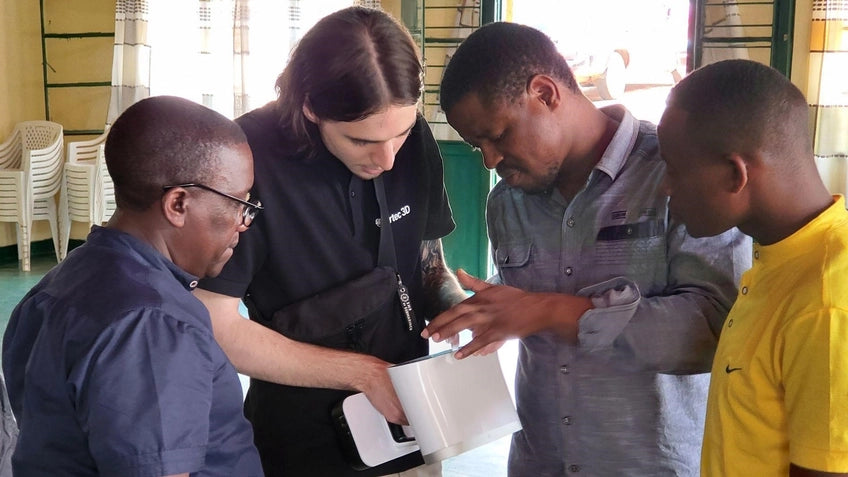
Artec 3D launches medical 3D scanning initiative with Handicap International

Artec 3D experts training medical staff to use the wireless Artec Leo 3D scanner
Leading 3D scanning hardware and software developer Artec 3D has partnered with Handicap International, an NGO fostering Humanity and Inclusion around the world, to customize medical devices for patients in Rwanda.
Through the humanitarian project, medical staff have been trained by Artec experts to quickly, easily measure arms, legs, and torsos using the world’s first wireless 3D scanner: Artec Leo. With the resulting data, doctors plan to tailor orthotics, prosthetics, and supports to patients, in a way that’s less intrusive and better meets medical needs in remote locations.
Designing these devices digitally will also allow them to be made with 3D printing, a technology that’s cheaper to adopt than traditional machinery, and more capable of rapid customization.

Handicap International medics honing their human body scanning skills
Compared to a low-cost alternative scanner they initially experimented with, the staff have found Leo’s built-in display and battery easier to get to grips with and utilize in the field. Additionally, thanks to the speed, precision, and usability of their first two devices, the team have been able to deploy them almost straight away, improving their overall ROI.
“It’s remarkable to see how Artec 3D’s partnership with Handicap International is improving healthcare accessibility in Rwanda,” said Artec 3D CEO & President Art Yukhin. “Leveraging cutting-edge technology like the Artec Leo, with its ease of use and intuitive interface, creates a significant impact on the ground by empowering medical staff to provide tailored solutions efficiently, especially to those in remote areas. It’s heartening to witness technology being harnessed for such impactful humanitarian endeavors. Following the success of our initial project with HI, we hope to recreate such promising experiences in other regions.”
With training from the two Artec 3D experts flown out to help, the Rwandan team have quickly been able to begin digitizing anatomies with high accuracy and precision. “After a brief training session, they could start scanning immediately,” said Jerry Klein, one of Artec 3D’s project training experts. “I saw it in their eyes; they were so impressed with how easy it was!”
Having mastered data capture and processing over a five-day training program, and passed a troubleshooting test, the clinicians are confident and can move into end-use scenarios.

Staff being trained to prepare scan data for medical applications in Artec Studio
In the months ahead, they plan to create children’s prosthetics that can be iteratively 3D printed to ‘grow’ with them, as well as custom orthoses for more effective joint realignment.
“This technology covers all our prosthetic and orthotic needs,” said Technical Project Manager Robert Clement Hakorimana. “Already, we have invited people from different hospitals to get them using this technology. We’ve also notified the Ministry of Health, so they can make it their own, and help disseminate it across the country.”
Backed by Luxembourg’s Ministry of Foreign and European Affairs, Directorate for Development Cooperation and Humanitarian Affairs, the project will allow Handicap International to expand its growing charity network. From demining in Iraq to tackling climate change in Nepal, the organization is actively changing lives for the better around the world.
For their part, the Leo-trained team in Rwanda now intend to invest further in CAD modeling and 3D printing, as they bid to improve the reach of their country’s care system.
Read more at Artec 3D website: https://www.artec3d.com/news/rwanda-medical-staff-training


